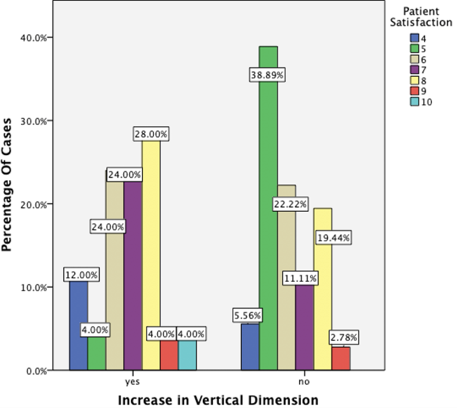Abstract
Full mouth rehabilitation is a comprehensive treatment and hence requires a longer duration along with patient co-operation and operator skill. Data of 86000 patients between June 2019 and March 2020 was reviewed from the patient’s records and analysed that was documented in Saveetha Dental College and Hospital, Chennai, India. 152 patients who underwent tooth supported full mouth rehabilitation were included in this retrospective study. The data regarding the duration of the entire treatment, patient satisfaction, type of temporary teeth and change in vertical dimension was collected from Dental Information Archiving Software (DIAS). The data censored was collected by recalling the patient and reviewing. Statistical analysis was performed using pearson’s correlation and chi square test to assess the association between patient satisfaction and increase in the vertical dimension, type of temporisation and duration of the treatment. The associations between patient satisfaction and increase in vertical dimension (Chi-square value : 8.809, df: 6, p value : 0.185), type of temporisation (Chi-square value : 8.809, df: 6, p value : 0.185) and duration of the treatment (Chi-square value : 303.548, df: 306, p value : 0.529) were statistically insignificant (p>0.05). From the available data it was observed the duration of the treatment plays a secondary role in relation to patient satisfaction in the treatment of full mouth rehabilitation cases. The quality of treatment and decisiveness in providing definitive care with respect to treatment needs gives better patient satisfaction.
Full text article
Authors

This work is licensed under a Creative Commons Attribution-NonCommercial-NoDerivatives 4.0 International License.

